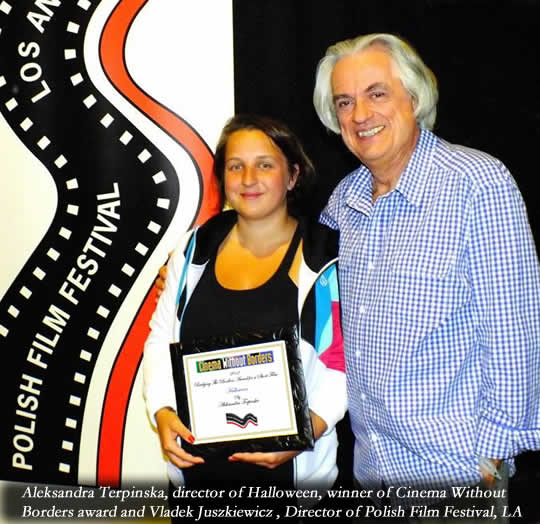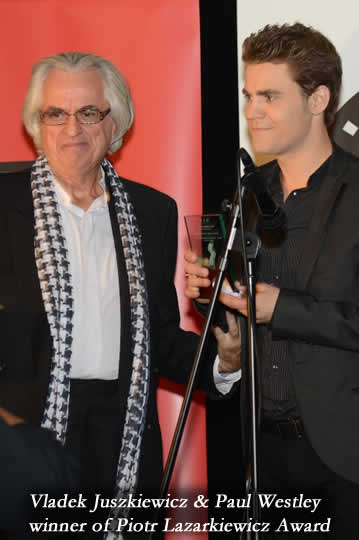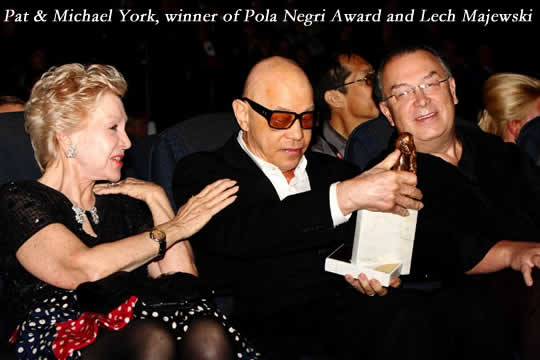 2012 Polish Film Festival, Los Angeles was a great success, it run for ten days with screening of new films from Polish films including 80 Million, Poland’s Oscar submission and The Mill and the Cross a masterpiece by Lech Majewski.
2012 Polish Film Festival, Los Angeles was a great success, it run for ten days with screening of new films from Polish films including 80 Million, Poland’s Oscar submission and The Mill and the Cross a masterpiece by Lech Majewski.
After the festival we had an interview with Vladek Juszkiewicz director and founder of the Polish Film Festival, Los Angeles, looking back at 2012 festival.
Bijan Tehrani: Looking back at the 2012 Los Angeles Polish Film Festival, how happy are you with the outcome?
Vladek Juszkiewicz: I am happy, the program was very good, people liked it. There was a very nice Q&A with the 20 or so guest from Poland and from LA, the new location was very nice and the audience was very appreciative, so I am happy.
BT: You changed the venue this year, how was the transition and did a solid audience show up for the screenings?
VJ: The people have to get used to it so some of them still went to the old venue at Sunset 5, but some people eventually came over and found out that it was not that bad so I think we will try this location again next year but there is always a reason to look around and find something more suitable or more central because as you now Los Angeles is so spread out so a central location would be preferable. 
BT: Maybe something about Noho is that Noho is a new art district and with all the theatres it is continuing to change more and more also with the subway station closes by.
VJ: The place is very vibrant and there are a lot of people who were coming in, they came to see other films and then found out about the festival and on the corner there is the art institute, so there are plenty of avenues that we have not crossed yet, so we will be thinking about it and try to go further.
BT: Your festival is among the longest festivals as far as the length of the festival that goes almost for ten days, how difficult is it to manage this festival with so many screenings and all that?
VJ: This is not that difficult to manage, because the Laemmle is very accommodating and they are very helpful. We eliminated almost all the screenings at 5 o clock so we needed the extra screening days. We try to show people more and more films so they can make choices, we are trying to give people as much as they can handle and I think it works.
BT: You had The Mill and the Cross which you screened at a different location, how was the attendance of that film?
VJ: The attendance was very good and there was a mixture of students from CSUN Northridge and other people from the city. If people want to see films they will make an extra effort to go. The Mill and the Cross was only screened there. There was a Q&A and post screening discussion with Tim Halloran and Katherine Zoraster moderate by John Schultheiss from CSUN to discuss the film with Lech Majewski, the director, so it was almost a full house.
BT: The opening ceremony at the Egyptian Theatre was quite interesting and entertaining and there was a lot of guest and the length of the night was very long but everyone stayed and watched the film that is going for the Academy Awards, was this the first time that you had Opening Night at the Egyptians? VJ: No, we opened the Festival there before. The red carpet was vibrnat and we had a number of Hollywood people, Michael York, Paul Wesley Deborah Aquila , Christopher Atkins, Rob Minkoff, Jerry Matters, James Duval, F. X. Feeney, Yola Czaderska-Hayek, HB Barnum, Helen & Peter Mark Richman, Theodore Bikel, Max Ryan, Ella Thomas, David Lago, Jeremy Konner, Mona May, Robet Fleet and from Poland actors: Roma Gasiorowska, Barbara Krafftowna, Michal Zurawski, directors: Lech Majewski, Barbara Sass, Mitja Okorn, Wiktor Skrzynecki, Rafak Mierzejewski, Jan Kwiecinski, Aleksandra Terpinska and Pawek Wysoczanski. So there were plenty of interesting people and they enjoyed the atmosphere and the food, the Opening Ceremony was not too long and they enjoyed the film, which is the most important thing.
VJ: No, we opened the Festival there before. The red carpet was vibrnat and we had a number of Hollywood people, Michael York, Paul Wesley Deborah Aquila , Christopher Atkins, Rob Minkoff, Jerry Matters, James Duval, F. X. Feeney, Yola Czaderska-Hayek, HB Barnum, Helen & Peter Mark Richman, Theodore Bikel, Max Ryan, Ella Thomas, David Lago, Jeremy Konner, Mona May, Robet Fleet and from Poland actors: Roma Gasiorowska, Barbara Krafftowna, Michal Zurawski, directors: Lech Majewski, Barbara Sass, Mitja Okorn, Wiktor Skrzynecki, Rafak Mierzejewski, Jan Kwiecinski, Aleksandra Terpinska and Pawek Wysoczanski. So there were plenty of interesting people and they enjoyed the atmosphere and the food, the Opening Ceremony was not too long and they enjoyed the film, which is the most important thing.
BT: You get so many celebrities and big names for your festival, how do you manage to do this?
VJ: I am just trying to collaborate with different people who are in the industry and they come to help and to get to those people and that is very helpful to do this so I think that its collaboration, collaboration, collaboration.
BT: How was the reflection of the festival in media here in the US and also in Poland?
VJ: We sent press releases and there was Polish television on the red carpet. Here in Los Angeles it is very difficult to get through, but the way we get info out is through banners on the street. This is a very difficult place to get through and make a statement.We collaborate with several organization to get the word out: SCUN, Chinese American Film Festival Hillel at UCLA, French Film & TV Office, Los Angeles Jewish Film Festival, South East European Film Festival, Vivetnamese International Film Festival and Consulate General of Switzerland. When we put the program together we think about those elements that we can go out into different communities and spread the news and it works.
BT: Are you planning for next year or is it too early to do that?
VJ: It is never too early, I always think about the next Festival. Putting the Festival and the program together is a year long activity and this is what keeps me going. The right program is a big part of the success of the Festival.

